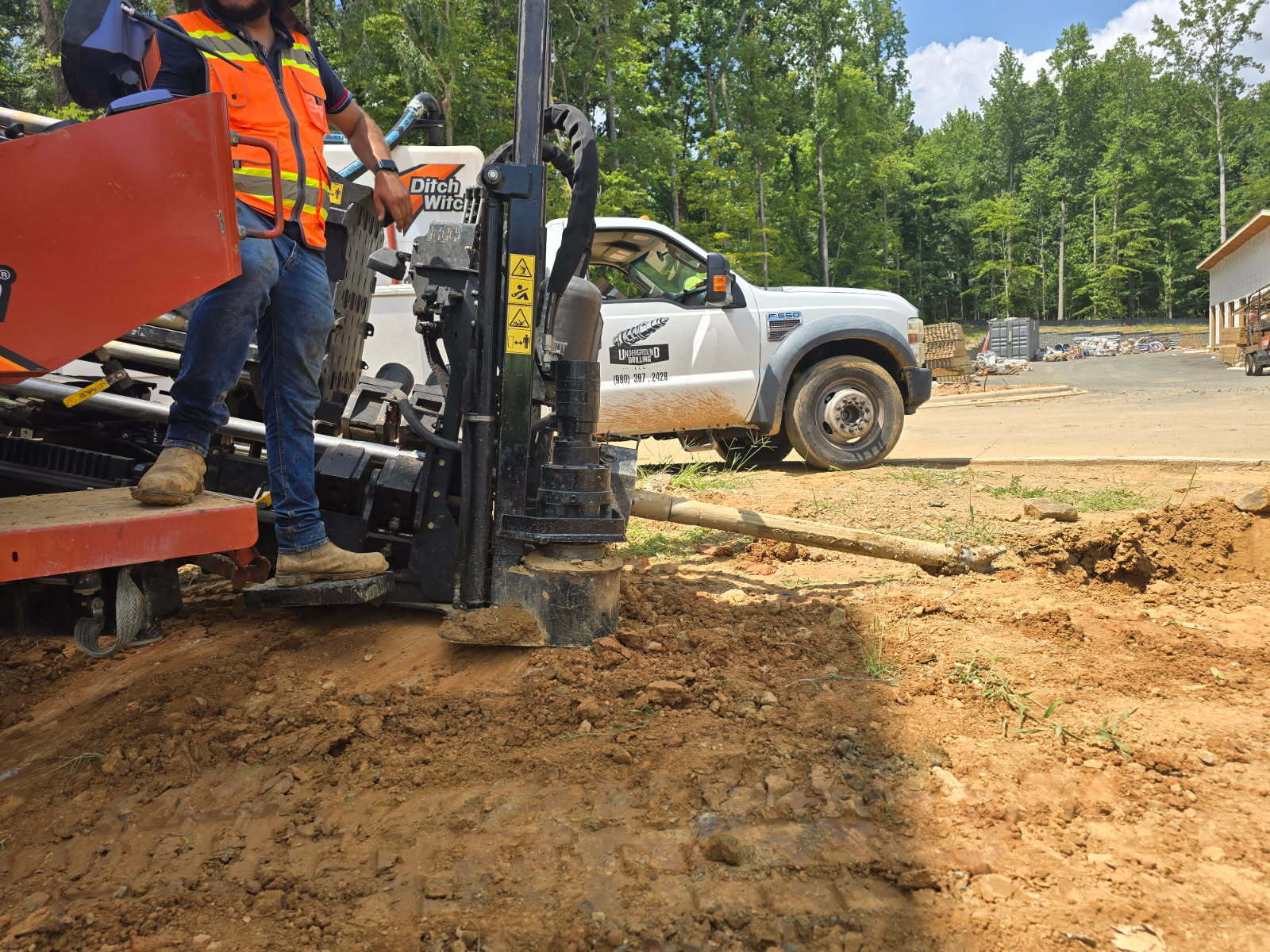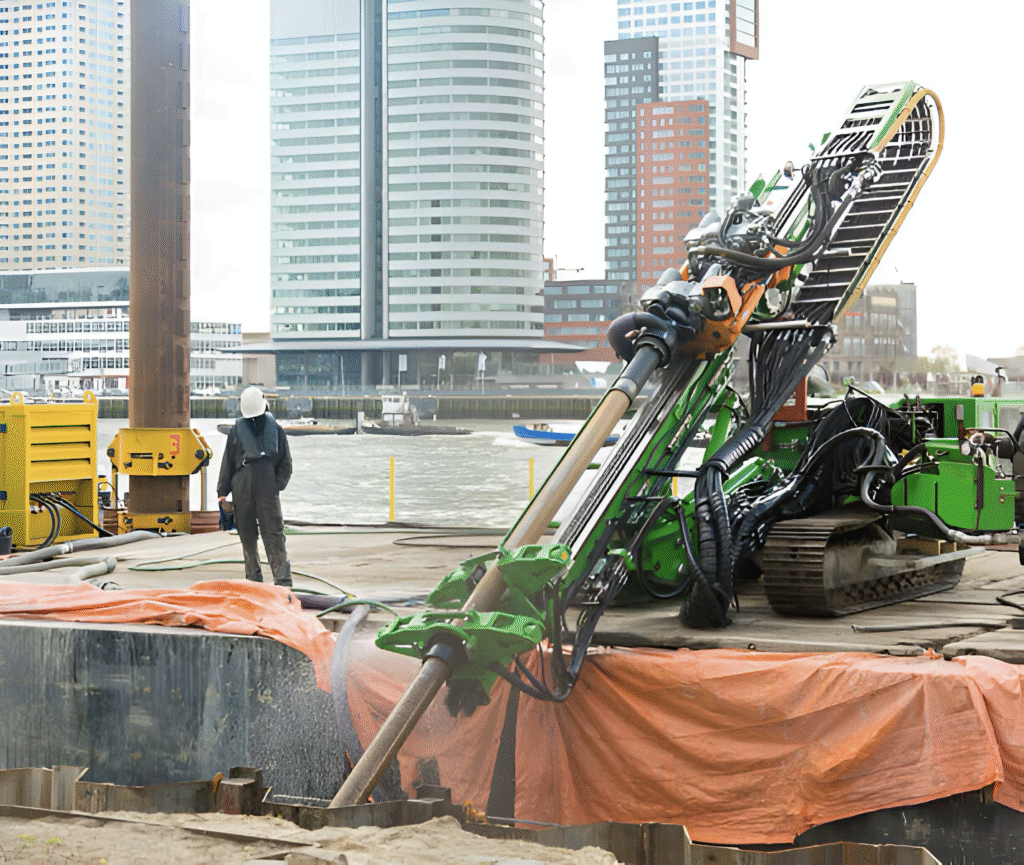Horizontal Directional Drilling (HDD) is a trenchless method used to install conduits, pipes, cables, and other underground utilities. It uses a steerable drill to create a pilot hole along a preplanned path, then enlarges the bore to pull in the final pipeline.
Costs for HDD are typically quoted per meter (or per foot), providing predictability for estimating across long distances. Prices vary widely based on multiple factors like soil type, project length, depth, pipe diameter, and site conditions. In this article, we’ll cover the average cost, what affects pricing, and how to estimate a project.
Average Cost of HDD per Meter
The cost of horizontal directional drilling cost per meter can vary widely depending on the project and local conditions. Typically, the price ranges from $20 to $30 per meter for standard soil conditions, with costs rising to approximately $80 to $100 per meter when drilling through heavy clay or installing larger 12-inch pipes. In some cases, particularly in urban, rocky, or complex sites, costs can reach up to $250 per meter.
Using per-meter rates is a practical standard, as it ensures predictability and consistency in estimating long runs and aligns with metric planning. In contrast, quoting per foot can vary regionally and complicate cost extrapolation.
Factors That Affect HDD Costs
Soil and Ground Conditions
Soft soils (clay, sand) can be easier to drill but risk instability; hard rock increases equipment wear and slows progress, requiring specialized bits and increased time.
Pipe Diameter & Material
Larger diameters require bigger reamers, more fluid, and more powerful rigs, thus driving up cost.
Depth of Installation
Deeper installations require advanced rigs, more powerful motors, and precise geotechnical planning, raising complexity and price.
Bore Path Length
Longer bores use more rods, incur longer machine time and labor, but per-meter cost may decrease due to scale efficiencies.
Location & Permitting
Urban or environmentally sensitive areas often require permits, impact studies, and utility coordination, which can increase both time and cost.
Restoration Requirements
Even though HDD reduces surface disruption, entry/exit pits still require back filling, landscaping, and pavement repair, each of which adds to the cost.
Comparing HDD to Traditional Trenching
At first glance, horizontal directional drilling (HDD) may appear more expensive than traditional trenching due to the higher upfront cost per meter. However, when the overall project expenses are considered, HDD often provides significant savings. Here are some of the main areas where it proves more cost-effective:
Reduced Surface Disruption
HDD is a trenchless method that avoids chopping up roads, sidewalks, landscaping, or sensitive ecosystems. This significantly minimizes surface disturbance compared to trenching, which involves extensive digging and excavation. HDD is especially well-suited for crossing rivers, highways, and built-up areas where trenching is impractical or disruptive
Lower Restoration Costs
Since HDD only requires small entry and exit pits, restoration is limited and significantly less costly. In contrast, trenching often demands full trench backfill, repaving, and landscaping repair, which can become major budget line items.
Faster Timelines in Challenging Environments
HDD can proceed without closing roads, disrupting businesses, or necessitating extensive detours. In congested urban areas or sensitive environments (e.g., wetlands, public spaces), this results in faster project timelines and cost reductions associated with minimized traffic control and permit requirements.
Useful When Crossing Roads, Rivers, or Developed Areas
Trenching often triggers the need for temporary traffic diversions, signage, and traffic control personnel, all at added cost. Because HDD operates underground, many of these logistics can be bypassed, resulting in smoother, more efficient site operations.
Cost Examples (Use Cases)
To better understand how horizontal directional drilling (HDD) costs vary, let’s look at three common project sizes and scenarios:
Small Project: Installing Telecom Lines in a Suburban Area
For residential or light commercial telecom installations, especially in soft soils, HDD commonly ranges from US $50 to $165 per meter. These figures reflect contractor quotes for straightforward fiber deployments in favorable conditions.
Medium Project: Water Line Crossing Under a River or Highway
Water line HDD installations generally cost between US $100 to $165 per meter. These crossings often involve deeper bores, environmental considerations, and potentially higher restoration and permitting costs.
Large Project: Pipeline Installation Under a River or Highway
On much larger projects (considering commercial-scale pipelines, long distances, or hard geology), prices escalate. Historical estimates for maxi-HDD range between US $650 to $1,650 per meter.
For perspective, a real-world municipal water line project in Ohio was quoted at US $95 per foot (about US $312 per meter) for HDD, plus an emergency contingency of US $30 per foot (approx US $100 per meter) due to road heaving risks. That brings the total to about US $125 per foot or US $415 per meter in high-risk conditions.
How to Get an Accurate HDD Cost Estimate
Effectively estimating HDD costs means moving beyond averages, you’ll need precision. Here’s how to approach it:
- Contact Multiple Contractors: Compare bids from several HDD providers to capture variations in equipment, labor costs, and project approach.
- Request Itemized Proposals: Request breakdowns that cover mobilization/demobilization, labor rates, equipment, materials (e.g., drilling fluid), and surface restoration.
- Account for Timeline and Weather Impacts: Seasonal challenges, such as frozen ground, rainy conditions, or restricted working hours, can significantly increase costs.
- Invest in a Site & Geotechnical Survey: Reliable soil and subsurface data help contractors provide realistic quotes, reducing the risk of surprises, such as encountering bedrock or unexpected utility lines during the project.
Final Thought
Horizontal directional drilling is not a one-price-fits-all service. Costs can range anywhere from $30 to over $100 per meter, depending on factors such as soil conditions, pipe size, project length, and restoration needs, and while the upfront cost of HDD typically surpasses that of trenching, HDD avoids costly surface repairs, reduces environmental disruption, prevents extensive traffic and landscaping restoration, and accelerates project timelines, especially critical in populated or sensitive areas.
It’s now time to take the next step. Reach out to experienced HDD contractors, ask for quotes, and discover how trenchless technology can save time, expense, and disruption on your next utility installation.



